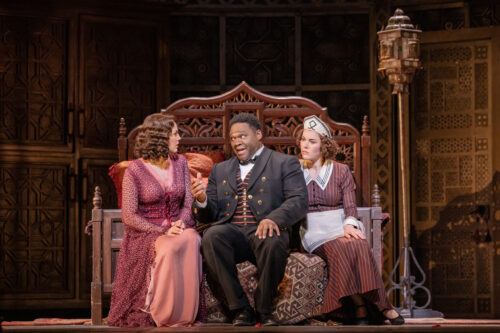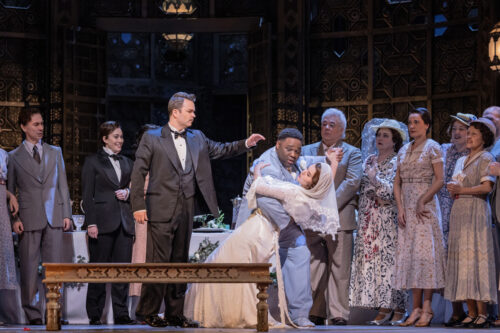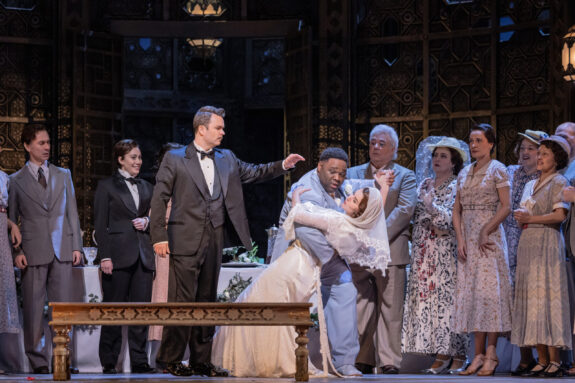 United States Mozart, Le nozze di Figaro: Soloists, Chorus and Orchestra of the Metropolitan Opera / Joana Mallwitz (conductor). Metropolitan Opera, New York, 31.3.2025. (ES-S)
United States Mozart, Le nozze di Figaro: Soloists, Chorus and Orchestra of the Metropolitan Opera / Joana Mallwitz (conductor). Metropolitan Opera, New York, 31.3.2025. (ES-S)

It is fair to assume that many spectators attending the season’s first performance of Richard Eyre’s familiar 2014 production of Le nozze di Figaro were drawn by Joana Mallwitz’s house debut. A portrait published by The New York Times in its weekend edition certainly helped raise the level of anticipation, framing her appearance as a major event. At 39, the German conductor has emerged as one of the most compelling figures of her generation. Her reputation was forged in the opera houses of Erfurt and Nuremberg and cemented more recently by her Salzburg Festival debut in 2020 – the first woman to lead a new production (Così fan tutte) there. Her approach to Mozart is lucid and rhythmically alert, drawing out the music’s dramatic tension without ever pushing tempi. The overture sparkled with detail and forward motion, and Mallwitz led with a sure sense of pacing and character throughout the evening, keeping textures transparent while allowing the singers ample space to shape their lines. The orchestra responded with finely etched playing – never overbearing, always attentive. If Eyre’s production, now a decade old, felt fluent if not fresh, it was Mallwitz’s presence in the pit that brought new vitality to the evening.
Truth be told, after the exquisitely rendered overture, the first scene – Susanna and Figaro’s enlightening dialogue in their newly designated room – did not begin on firm footing: the voices were a tad hesitant, and alignment with the pit lacked precision. Yet any early tentativeness appeared to be short-lived, as ensemble cohesion improved and vocal assurance grew. The complex group writing of Acts II and III revealed moments of both poise and fragility. The Act II finale – with its growing number of characters, each adding to the overall confusion upon entering the space – was delivered with theatrical clarity, though not always with complete musical precision. In Act III, the sextet ‘Riconosci in questo amplesso’ was shaped with assurance, and the comic energy of the scene came across effectively, despite some fluctuation in vocal balance. Still, the overall musical direction retained a sense of momentum and expressive purpose. Mallwitz’s leadership remained attentive throughout, even if her tendency to linger on details occasionally unsettled the broader flow.
As Figaro, Michael Sumuel offered a performance marked by vocal warmth, agility and a sense of comic timing. His virile bass-baritone projected smoothly and carried effortlessly in the house. ‘Se vuol ballare’ was shaped with elegant phrasing and a fine sense of proportion, and the ironic bite of ‘Aprite un po’ quegli occhi’ was cleanly articulated, though one might have wished for a more pointed satirical edge. Sumuel portrayed a character who, far from being a subversive firebrand, was more composed than mercurial. Attuned to Mallwitz’s buoyant pacing and the quicksilver intricacy of Mozart’s score, Sumuel proved a stable and reliable anchor in all the ensemble scenes.
In a staging that often preferred polish over volatility, Olga Kulchynska’s Susanna fit neatly into the evening’s overall aesthetic. She brought a bright, silvery soprano and a poised yet charming stage presence to one of Mozart’s most demanding and subtly layered roles. Her voice, while not especially voluminous, had a natural sense of line – particularly effective in the smaller duets: both the biting exchange with Marcellina and the more lyrical ‘Canzonetta sull’aria’ with the Countess. There were moments – particularly in recitatives – when the characterization could have used more spontaneity, and her tone occasionally hardened under pressure in the upper range. Still, her musical instincts remained solid, and ‘Deh vieni, non tardar’ was shaped with grace – even if it lacked a certain inwardness or magic. Dramatically, she maintained a consistent presence throughout, her control allowing moments of humor, irritation or tenderness to emerge with subtle impact.

Even if the performance begins by depicting, during the overture, one of Count Almaviva’s many amorous pursuits, the character is not necessarily presented as an overt predator. With his firm, attractive baritone, well-suited to Mozart’s aristocratic phrasing, Joshua Hopkins delivered a performance that, in keeping with the overall directorial approach, was measured and less confrontational. His ‘Hai già vinta la causa’ was notable more for its articulate, elegant legato than for any tantrum-like outburst.
Federica Lombardi was the vocal anchor of the evening, offering a Countess of great emotional complexity and vocal refinement in an approach that avoided sentimentality but never felt distant. Her soprano, full of bloom and warmth, projected easily while retaining a finely spun pianissimo. ‘Porgi amor’ unfolded in long, delicately sustained phrases, each delivered with great breath control and quiet intensity. ‘Dove sono’ was elegantly shaped, with a graceful sense of journey imbuing the aria’s two parts: the first half shaded in quiet sorrow, the reprise of the main theme shaped with gentle rubato and expressive generosity.
The secondary roles were also exquisitely cast, adding color and vitality to the production. Maurizio Muraro and Elizabeth Bishop brought a wealth of experience to Bartolo and Marcellina, their comic timing sharp and their vocal delivery confident. As Cherubino, Sun-Ly Pierce offered a spirited, physically expressive portrayal, with a bright mezzo-soprano and irrepressible energy. ‘Voi che sapete’ was sung with charm and fluidity, if somewhat short on introspective nuance, while ‘Non so più’ was brisk and light. With a strong stage presence, Mei Gui Zhang’s Barbarina left a mixed impression in the brief yet profound ‘L’ho perduta, me meschina!’ Her delivery didn’t fully do justice to one of the most haunting and distinguished moments in the entire Mozart canon, regardless of the role’s importance.
A decade after its unveiling, the Met’s current Le nozze di Figaro remains a smart, tightly managed production. The staging’s fluidity and comic timing continue to be among its chief strengths – avoiding slapstick while sustaining a buoyant pace. As in several of Richard Eyre’s operatic ventures, the concept is intelligent and stylish but ultimately cautious, prioritizing dramatic clarity over psychological or political bite. Like his earlier Carmen for the Met, which shifted the action to Franco-era Spain, Eyre’s Figaro relocates Mozart’s opera to a 1930s Spanish villa on the eve of civil war, suggesting a backdrop of looming social collapse. Yet, as in Carmen, the transposition remains largely superficial: the historical setting offers visual novelty but little in the way of deeper engagement with pre-Revolutionary themes or Civil War resonances. The class tensions that drive Figaro are smoothed over rather than sharpened.
Rob Howell’s rotating set, with its warm hues and elegant architectural symmetry, enables seamless transitions and supports the score’s kinetic energy – particularly in the Act II finale and Act IV’s nocturnal intrigues. But do the hanging lamps and tall, mashrabiya-like mobile walls – evoking Seville’s Arabic past and symbolically tied to concealment and voyeurism – truly shed new light on Mozart and Da Ponte’s opera?
What ultimately lifted this revival was not the directorial concept but the dramatic coherence and musical commitment of the cast. From Lombardi’s richly shaded Countess to the fluid interplay between Sumuel and Kulchynska, this was a Figaro shaped less by theatrical reinvention than by the performers’ ability to inhabit the opera’s emotional terrain with honesty and finesse.
Edward Sava-Segal
Production:
Director – Sir Richard Eyre
ets and Costumes – Rob Howell
Lighting – Paule Constable
Choreographer – Sara Erde
Chorus director – Tilman Michael
Cast:
Figaro – Michael Sumuel
Susanna – Olga Kulchynska
Dr Bartolo – Maurizio Muraro
Marcellina – Elizabeth Bishop
Cherubino – Sun-Ly Pierce
Count Almaviva – Joshua Hopkins
Don Basilio – Brenton Ryan
Countess Almaviva – Federica Lombardi
Antonio – Paul Corona
Barbarina – Mei Gui Zhang
Don Curzio – Tony Stevenson
